In case you’ve been living under a rock: summer is upon us. The sun is out, temperatures are rising, and it really feels like we can get back to the good life again, doesn’t it? If like me, you plan to travel as much as you can this summer, we’ve got some tips to keep you safe if you choose/need to bring your medicine with you. If you're staying in the country, you've got quite a few options, especially if you already have a Medical Cannabis Card.
Cannabis Legalization Terminology
Before we get into the nitty-gritty, we've got to talk terms. When dealing with a federally illegal controlled substance like this, it’s important to know exactly what your rights are. A misjudgment of the law in your current location could land you in some pretty hot water, so let’s go over the big ones.
Recreational/Adult Use: This typically means that any person over the age of 21 can consume it, possess reasonable amounts of it, and maybe grow a plant or two. Recreational programs typically follow the same guidelines as alcohol — be wary of where you are when consuming, don’t operate heavy machinery or drive, etc. Sixteen states in the US, plus the District of Columbia, fall into this category. Many recreational states also have medical programs.
Medical/Medicinal: This means that cannabis use is approved for a (sometimes very limited) range of medical conditions. Utah falls into this category with 35 other states. Some of these states also have reciprocity laws, meaning that visiting patients with an active Medical Cannabis Card can gain access to the dispensaries, but we’ll get more into this later.
Decriminalized: Depending on the state in question, decriminalized cannabis can mean many things, but typically it means no jail time. Decriminalized states have lowered penalties for possession and use to a citation, fine, or misdemeanor. Some decriminalized states also have medical programs.
Illegal: This one is pretty self-explanatory. Don’t do it!
States with Recreational or Adult-Use Cannabis Programs
The easiest way to ensure you’ll have access to your medicine while traveling is to visit a place where cannabis is legal for adult use. Remember, legal doesn’t always mean legal, so it’s best to familiarize yourself with specific caveats to state recreational programs. Here are some things you’ll want to know before your trip to a recreational or adult-use state.
- Alaska: Legal for purchase and consumption by those 21+, possession of one ounce or less, and growing up to three mature plants. You’re not allowed to smoke in public,
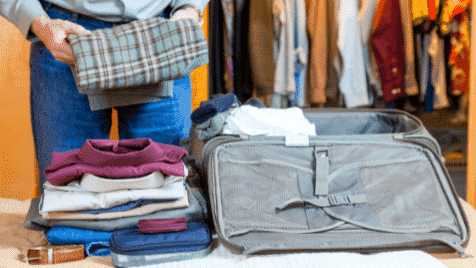 however, Alaska legalized consumption on-site at dispensaries in 2019. So, if you find yourself in Alaska and need to use your medicine while you’re out, find the nearest dispensary. Alaska also has a medical program.
however, Alaska legalized consumption on-site at dispensaries in 2019. So, if you find yourself in Alaska and need to use your medicine while you’re out, find the nearest dispensary. Alaska also has a medical program.
- Arizona: Cannabis is legal for purchase and consumption by those 21+, possession of up to one ounce and/or five grams of concentrate, and cultivation of up to six plants for personal use. You are not allowed to smoke in public, though medical patients can consume edibles in public. Arizona also has a pretty extensive medical program (roughly 300,000 patients!), which allows qualifying patients to possess up to 2.5 ounces and even grow up to 12 plants if they’re more than 25 miles from a dispensary.
- California: One of the most popular adult-use programs, California is known for its cannabis. After years of fine-tuning their program, it’s legal for adults 21+ to possess up to an ounce of flower and eight grams of concentrate, and grow up to six plants. California also still has a medical program that many take advantage of due to increased possession limits. Fun fact: It’s a misdemeanor to sell recreational marijuana if you’re not a dispensary, but gifting it? Totally fine as long as it’s under 28.5 grams. If your new life goal is to be invited to a white elephant gift exchange in California, you’re not alone.
- Colorado: Another state known for its cannabis, Colorado’s adult-use program allows adults 21+ to possess up to an ounce of weed on them. Like California, there are no penalties for “sharing” your cannabis. A recreational delivery program is also available throughout the state.
- Illinois: Illinois is new to adult-use, having only legalized it at the beginning of 2020. Residents 21+ can purchase and possess up to an ounce of flower, but like many other states, you’re not allowed to consume it in public. Non-residents are only permitted to purchase and possess up to fifteen grams of flower and 2.5 grams of concentrate. Growing is also not permitted (unless you’re a part of their medical program, in which case you’re allowed up to five plants). Illinois is also working on making it a crime to get your pets high, which we here at UtahMarijuana.org fully support. Animals have a different endocannabinoid system than humans and the cannabis we use can hurt them — don’t do it!
- Maine: As a 21+ resident of Maine, you’re allowed to possess as much as 2.5 ounces of cannabis. And if you’re a part of the 45,000-patient-strong medical program, you’re also allowed to grow up to six plants. Don’t smoke in public, though!
- Massachusetts: In Massachusetts, anyone over 21+ can have one ounce of flower on them, but can possess up to ten ounces at home. It’s also legal to grow up to six plants for personal use. Many dispensaries in the state also have a delivery program for recreational and medical users.
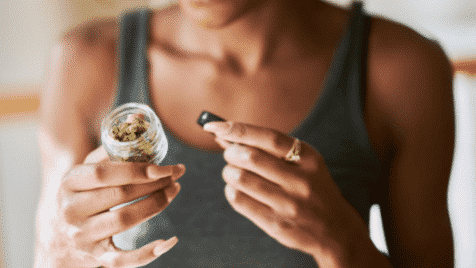
- Michigan: Those that are 21+ can possess up to 2.5 ounces on them at any one time (up to 10 ounces at home) and grow up to 12 plants. Though there are retail dispensaries in Michigan, you won’t find them everywhere, as some cities have opted out of adult-use sales. A few things to note: Possession of more than five ounces anywhere outside of your own home is a misdemeanor as a first offense. Sharing your cannabis comes with a $500 fine for amounts between 2.5-5 ounces. Sharing for compensation, i.e., selling, is a felony.
- Montana: Just joining the recreational group of US states, Montana plans to see recreational sales start around January 2022. As of right now, it’s legal for those 21+ to possess or grow up to 1 ounce or 8 grams of concentrate. That being said, possession of more than this amount is still considered a felony and could stick you with up to five years in jail and a fine up to $5000. Medical patients are allowed to cultivate up to four mature plants and four seedlings for personal use.
- Nevada: Adults 21+ can carry up to one ounce of recreational cannabis. In true Nevada fashion, prices for recreational products will be pretty high, so I’ll let you in on a little secret. Flash your Medical Card in Nevada dispensaries! Out-of-state cards are accepted in Nevada without any additional hoops to jump through, and the discounts are pretty stellar. It’s not quite a free-for-all out there in Nevada, though. Smoking in public or possession of more than an ounce can get you a misdemeanor (typically a fine with no jail time).
- New Jersey: One of the more recent states to legalize cannabis, you can find dispensaries, delivery, and curbside pickup services all over the state. The current law doesn’t allow for recreational home-growing, though additional legislation is being explored to allow up to six plants.
- New Mexico: New Mexico’s recreational cannabis sales began in April of 2022. Adults 21+ can possess up to two ounces of flower on them at all times, though the amount you can have in your possession at home is "unspecified." New Mexico also has a medical program for patients with over two dozen conditions, allowing for possession of eight ounces every 90 days. Patients are allowed to grow as many as 16 plants, as long as only four are mature at once.
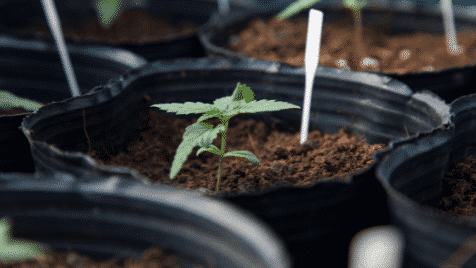
- New York: Also legalized early this year, adults 21+ can possess up to three ounces and grow up to six plants. You won’t see dispensaries or sales until 2022, but when the time comes, it’s going to be pretty spectacular. It’s been rumored that delivery and designated cannabis lounges will be a part of this massive industry once it takes off. Fun fact: NYC residents consume more cannabis than any other city on Earth with an estimated 77 ½ metric tons per year. That’s twice as much as Los Angeles and 12x more than Denver. That’s a lot of weed, folks.
- Oregon: Cannabis has been legalized for adult use since 2014 in Oregon. You can possess up to one ounce, though anything more will land you with a fine. You’re also allowed to grow up to four plants as a recreational user. For medical patients, those numbers reach up to 24 ounces and up to six plants (plus 18 seedlings).
- Vermont: Though cannabis has been legal for a while in Vermont to grow, possess, and consume, you won’t find any place to legally purchase it. Yes, that means that you’ve got to grow your own or sneak it over state lines. (Friendly reminder that crossing state lines with cannabis in any form is a felony and should be avoided at all costs.) The good news is that the state has finally allowed dispensaries to open and have given those dispensaries a deadline of May 1, 2022 to do so.
- Virginia: Though passed in February 2021, adults 21+ must wait until July 1, 2021 to legally possess up to an ounce. You won’t find any recreational dispensaries for quite a while (think years, not months), though medical dispensaries exist for patients with qualifying conditions.
- Washington D.C.: Though legal to possess, selling cannabis in D.C. is prohibited. There’s a very strange rule allowing residents to grow up to six plants, out of which they're allowed to give away up to an ounce, but not sell it. This has caused some companies to use cannabis as an incentive for other sales. “Buy a t-shirt, get a free joint!” There’s currently a bill on the floor called the Safe Cannabis Sales Act of 2021, and if passed, D.C. plans to have dispensaries up and running by next fall.
- Washington: The state of Washington tied with Colorado as the first state to legalize recreational use back in 2012. You can possess and consume it (not in public), but only those with a Medical Cannabis Card can grow it. You’ll find cannabis dispensaries all over Washington and more than half of all the tax revenue from cannabis sales funds various public health programs. Pretty cool!
States with Medical Cannabis Reciprocity or Temporary Cards
In layman’s terms, a state with Medical Cannabis program reciprocity is a state that will honor Medical Cannabis patient status and Medical Cannabis Cards from other states, through mutual or corresponding actions. You may not get all the benefits you’d get in your home state, but you’ll get some. States that will honor a Medical Cannabis Card in some capacity are as follows:
- Alabama
- Arizona
- Arkansas
- Florida*
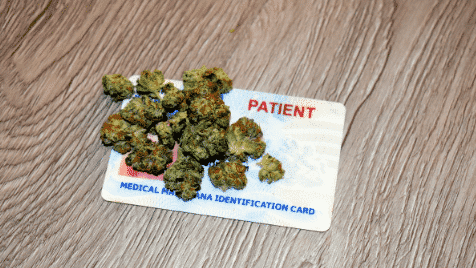
- Hawaii*
- Kentucky
- Nevada
- Maine
- Michigan
- New Hampshire
- New Mexico
- Oklahoma*
- Puerto Rico
- South Dakota*
- Utah*
- Washington D.C.
Laws change all the time and are not standard in each state, so we always recommend looking into the laws of the specific state you plan to visit before your trip. Some states will only honor reciprocity from certain states, while others will allow you to possess during your stay, but not purchase. Know before you go.
*These states allow for reciprocity in the form of a temporary card that the medical patient must apply for. These temporary Medical Cannabis Cards are often limited to a certain number of days per calendar year. Please look into the reciprocity programs in the state you plan to visit to ensure that you qualify.
States That Have Decriminalized Cannabis
As mentioned above, “decriminalized” can mean many different things depending on where you are. States that have decriminalized cannabis have typically eliminated the threat of incarceration for possession, use, or purchase. Many decriminalized states have legalized cannabis either medically or recreationally as well, but not all of them. (Looking at you, Nebraska and North Carolina.)
- Connecticut
- Delaware
- Hawaii
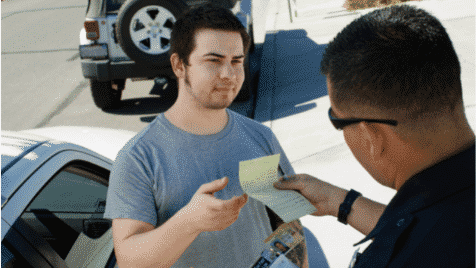
- Maryland
- Minnesota
- Mississippi
- Missouri
- Nebraska
- New Hampshire
- North Carolina
- North Dakota
- Ohio
- Oregon
- Rhode Island
Technically speaking, if a patient were VERY desperate and in need of Medical Cannabis and taking an unavoidable trip to one of these states, it’s certainly safer to consume here than, say, Idaho. We never recommend illegal use of cannabis, but if you must, make sure to look into the charges you’d face if caught. Fines will vary according to state, the amount in possession, or for repeat offenders. Say it with me this time: know before you go.
States Where Cannabis is Illegal
If you’re planning to visit the following states any time soon, know that any possession, use, purchase, or sale of cannabis in any form is absolutely prohibited. If caught doing any of those things, a patient faces fines, jail time, or felony charges.
- Georgia
- Idaho
- Indiana
- Kansas
- South Carolina
- Tennessee
- Wisconsin
- Wyoming
Have a Wonderful, Medicated Summer, Fellow Medical Cannabis Card Holders!
I feel obligated to remind all of you that I am not a lawyer. UtahMarijuana.org does not offer any official advice on this site, whether medical or legal. Saying “but this blog post said I could!” will not hold up in court. Do your research, be smart about it, and consult a legal professional for advice if needed. Please comment below with any tidbits about other states’ cannabis laws that you’ve found or a sweet reciprocity perk you’ve encountered. We'd love to hear from you. And as always, stay safe out there.
Note: We do our best to update posts like this when legislative updates are made, but may not catch everything. Please confirm laws and regulations in the state you plan to visit with state legislation.
"Laws," WeedMaps, accessed June 24, 2021, https://weedmaps.com/learn/laws-and-regulations.
 however, Alaska legalized consumption on-site at dispensaries in 2019. So, if you find yourself in Alaska and need to use your medicine while you’re out, find the nearest dispensary. Alaska also has a medical program.
however, Alaska legalized consumption on-site at dispensaries in 2019. So, if you find yourself in Alaska and need to use your medicine while you’re out, find the nearest dispensary. Alaska also has a medical program.



